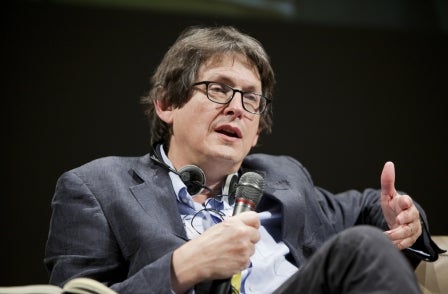
Guardian editor Alan Rusbridger warned today that is almost impossible for journalists to maintain the confidentiality of their sources because of the threat of surveillance.
And he said that this problem was at the heart of the debate prompted by revelations his paper made based on the documents stolen by Edward Snowden from the NSA.
Rusbridger told a London School of Economics conference: "Every journalist should understand that there is no such thing as confidential digital communication. None of us have confidential sources.
"Peer to peer encryption is difficult for most journalists and it is quite time consuming and most journalists don't do it.
"We are all going to have to work on this in this world where people can intercept everything."
He revealed that Guardian journalists now use encryption techniques and have changed the way they talk on phones and use email following the Snowden investigation.
Rusbridger also explained why The Guardian failed to contact the DA-Notice Committee in advance of its first UK-centred Edward Snowden revelation – details about how the UK spied on delegates at a G20 summit.
The DA-Notice committee secretary claims to offer advice on a voluntary basis to ensure publications don't inadvertently threaten national security or put UK lives at risk. With the G20 story it has been alleged that The Guardian revealed details about spycraft which harmed UK interests.
Rusbridger said: "I was anxious that by ringing the DA Notice commitee that would trigger awareness in Government that we were about to publish something." If the Government had known about the story in advance it could have sought an injunction.
Rusbridger said he has consulted the DA Notice committee on subsequent Snowden stories and said "we've found them to be helpful".
Asked whether The Guardian's 2011 story revealing that missing schoolgirl Milly Dowler's phone had been hacked by the News of the World was timed to scupper News Corp's bid for BSkyB, Rusbridger gave an emphatic denial.
He said that journalist Nick Davies had been working on the story for months: "He was just a hack, this story came along and he ran it. I saw it for the first time on the Sunday, we edited it on Monday morning and published it on Monday evening."
On the question of whether The Guardian caused the closure of the News of the World, which happened days after the Dowler story was published, Rusbridger said: "We now know that News International was looking into closing the News of the World weeks before that."
He said he would have kept the paper open: "I didn't like some of the things they did but it had a 160-year history of campaigning journalism. For Murdoch to close it down because this was going to be bad for his other businesses, this was a real act of vandalism."
Rusbridger also confirmed that he is waiting to see who is appointed chairman of the Independent Press Standards Organisation before deciding whether or not to join the new regulator, which is due to be up and running on 1 May.
He said: "The bones of IPSO are not bad and it will be better than what went before."
He said the main question for IPSO was whether the Regulatory Funding Company, which represents press owners, will control the new regulator in the same way that it did the Press Complaints Commission.
He said: "Let's see who is appointed chairman, let's then talk to them to see how robust it really is."
Interviewer Steve Hewlett asked him: "Is the most likely outcome that The Guardian will sign up to IPSO?"
Rusbridger: "I don't know"
Press Gazette asked the Guardian editor whether its free online model risks undermining the title's editorial independence. The Guardian currently has a sustainabilty section paid for by Procter and Gamble, a citizen journalism project (GuardianWitness) sponsored by EE and 'Cities' coverage in print and online "supported by" the Rockefeller Foundation.
He said: "The test is whether anyone can find anything that has changed in our journalism. The dangers are obvious."
Email pged@pressgazette.co.uk to point out mistakes, provide story tips or send in a letter for publication on our "Letters Page" blog
